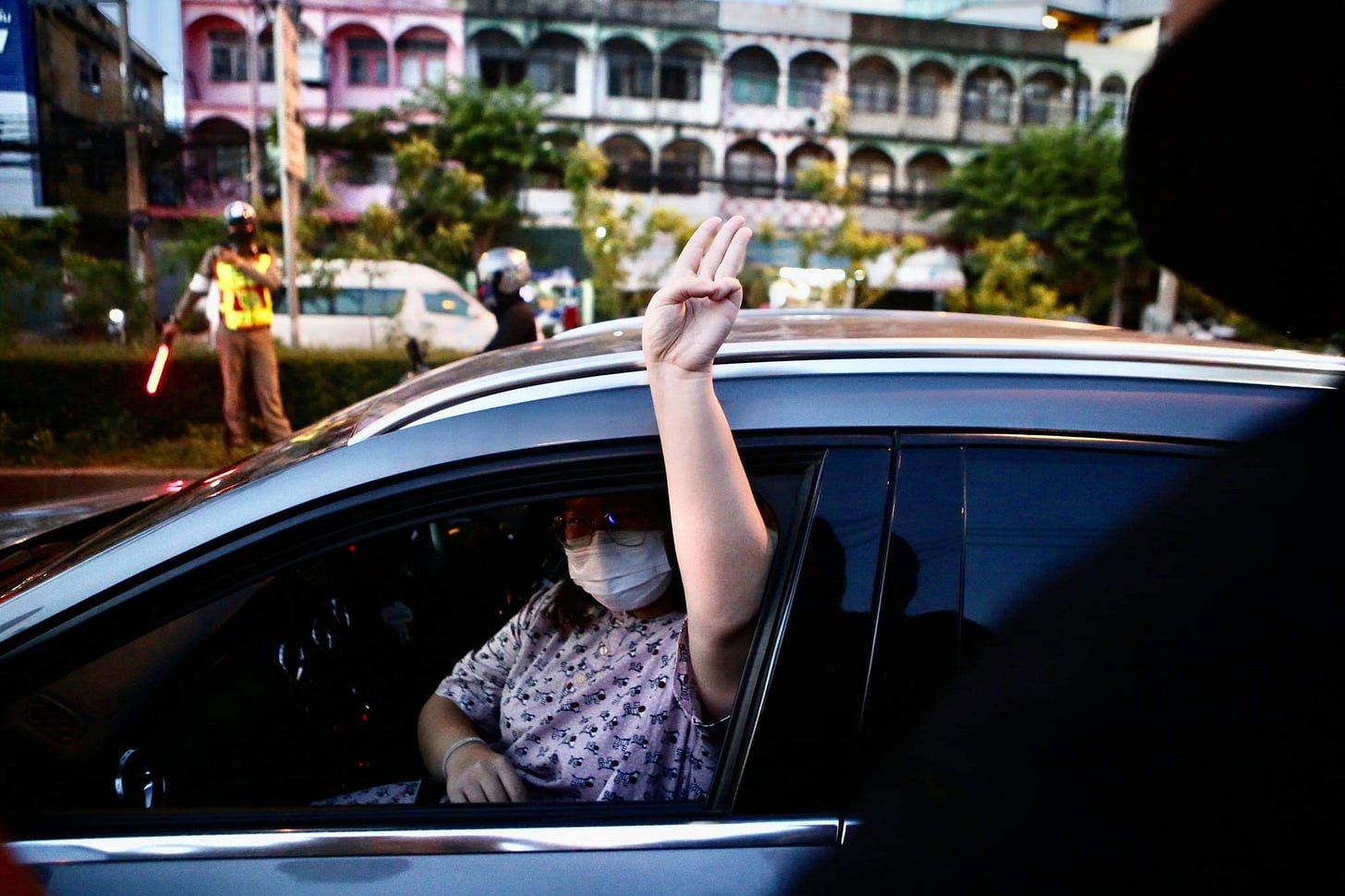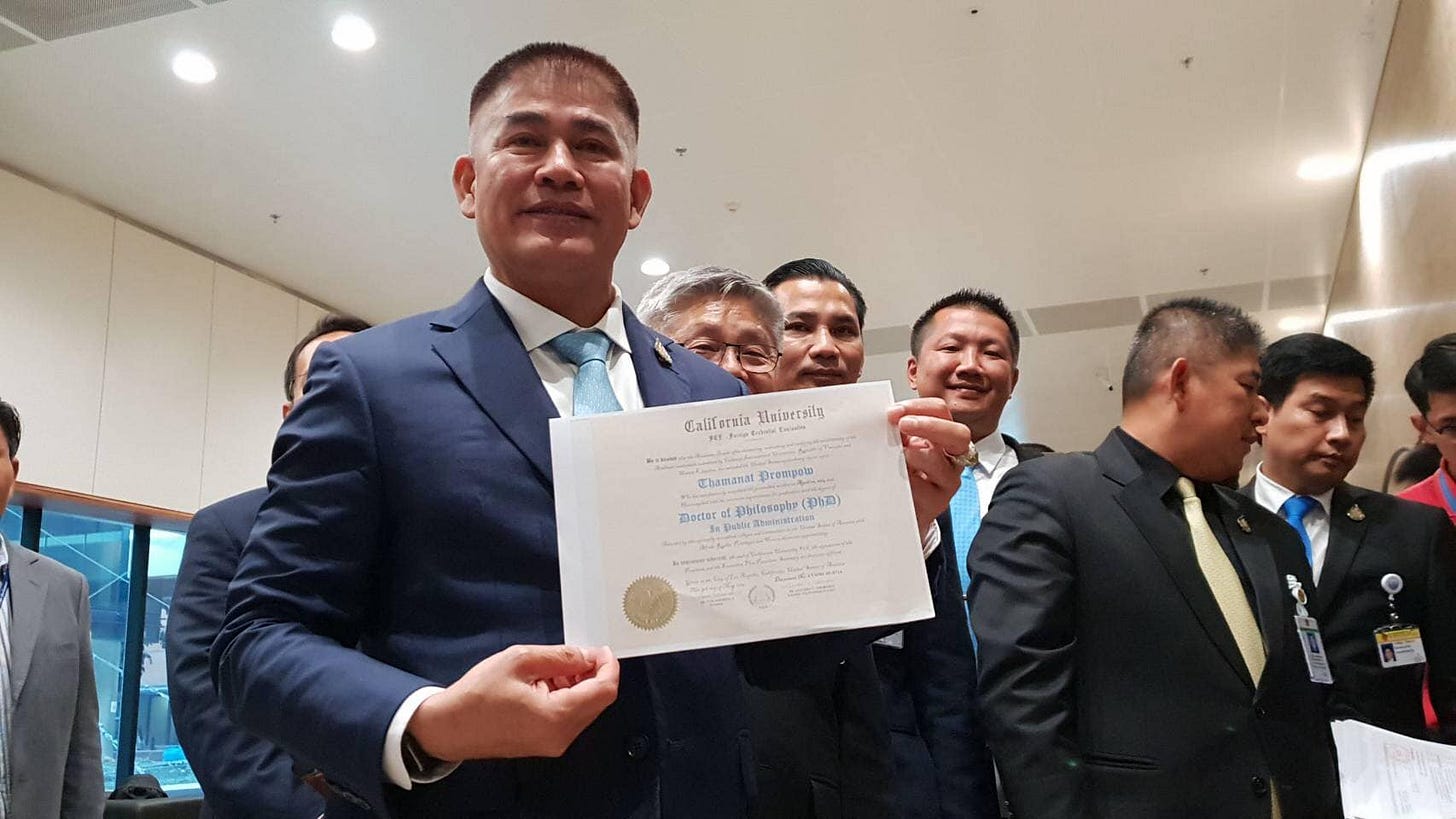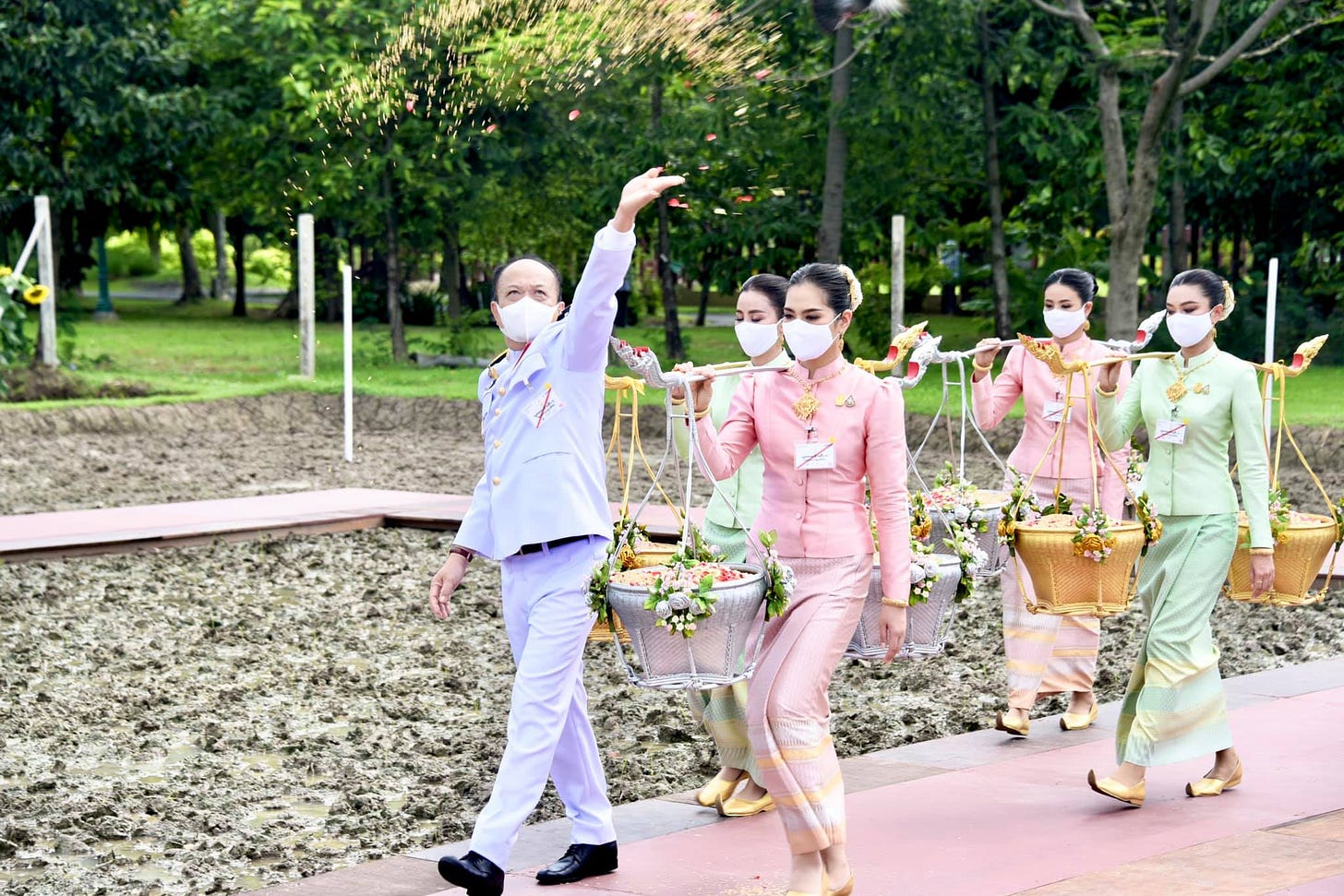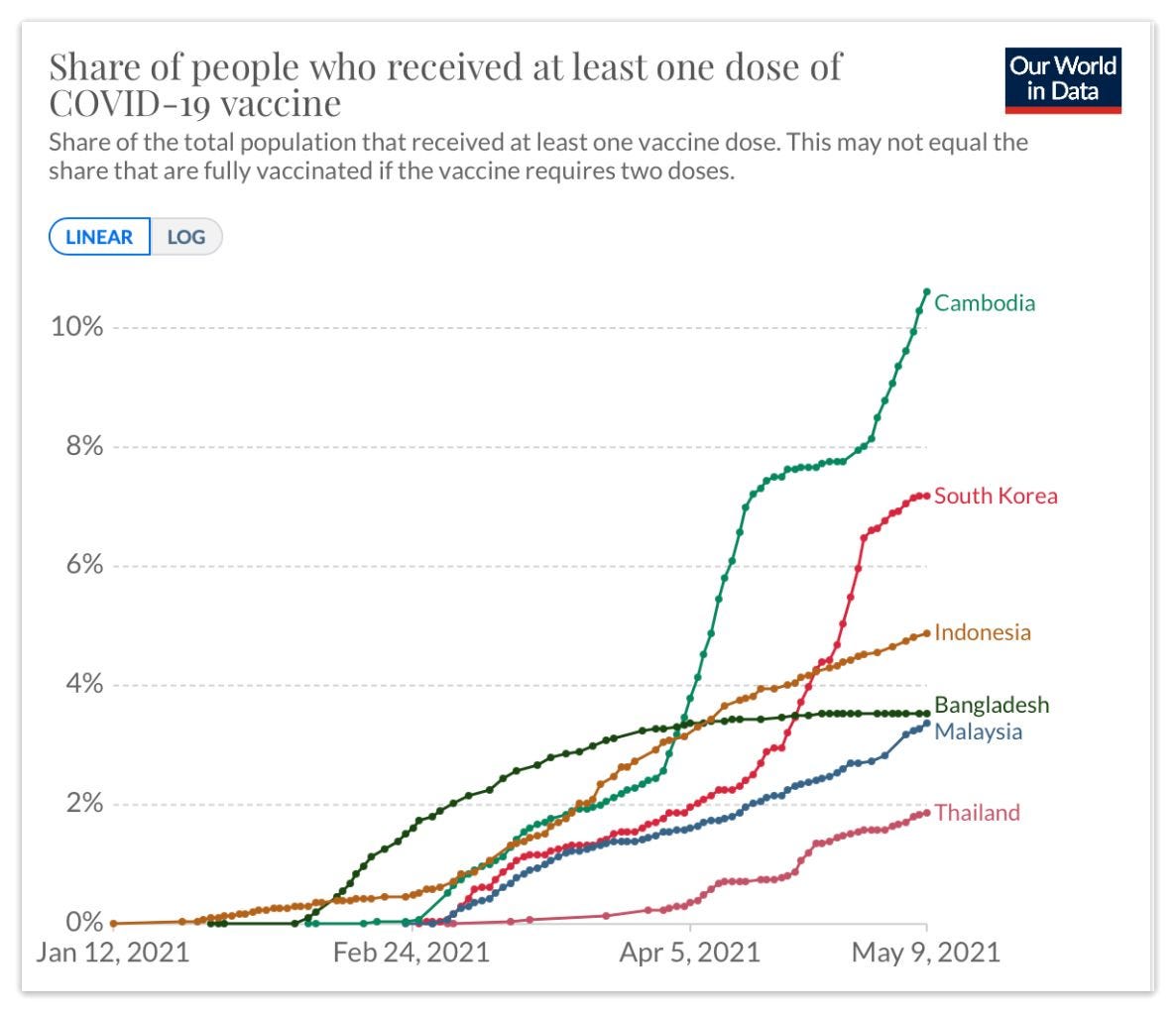Thai regime backs down over bail in victory for hunger strikers
Also in this edition: The Constitutional Court says it's fine for a convicted drug dealer to be a cabinet minister, as another criminal tells Thais it's cool to crawl
Welcome to the weekly Secret Siam news roundup. If you haven’t subscribed yet, please do — paid subscriptions really help support my journalism and fund more Thai translations of my work. If you prefer not to pay, you can still sign up for free editions.
To everybody who has already subscribed, thank you very much! Now onto the week’s news…
Rung gets bail but Penguin still in danger
The Thai regime has finally begun to back down in its agonising game of brinkmanship with two protest leaders who have spent weeks on hunger strike over the refusal to grant them bail. At a hearing last Thursday at Bangkok Criminal Court, 22-year-old Panusaya “Rung” Sithijirawattanakul was released on bail at last. She had been in detention since March 8 and began refusing food on March 30.
The palace had ordered that leading activists accused of lèse majesté should be kept in jail without bail, but the regime began to worry after it became clear that Rung and her comrade Parit “Penguin” Chiwarak, also 22, were willing to starve themselves to death in protest against their detention.
As I reported two weeks ago, the unexpected release of Somyot Pruksakasemsuk and Jatupat “Pai Dao Din” Boontararaksa suggested the authorities were seeking a face-saving exit from the standoff, and Rung’s release confirms that they are backing down for now. Other key figures in the democracy movement including volunteer guard leader Piyarat “Toto” Chongthep and Siriphop “Khanun” Phoomphungphut were released on bail last week. Toto was interviewed live on Monday by Pravit Rojanaphruk of Khaosod English, and you can view their discussion here.
The person who needs to be most urgently released is Penguin, because he is now entering his ninth week on hunger strike, and is increasingly ill and unwell. The regime’s decision to start releasing protest leaders was a direct result of Penguin and Rung’s hunger strike — the authorities don’t want them to die in these circumstances because it would cause huge anger and do more damage to the legitimacy of the government. But coronavirus has been spreading among detained activists, with human rights lawyer Anon Nampha the latest to test positive. Because Penguin had been sharing a cell with people who later turned out to be infected, he was obliged to remain in quarantine and was not able to seek bail on the same day as Rung. It’s probable he’ll finally be released this week, but given his weakened state, there is still a risk he could die before being bailed, especially with covid-19 rampant among detainees at Bangkok Remand Prison. The regime is playing a dangerous game by delaying his release this long.
Patpicha Tanakasempipat at Reuters wrote an excellent article on the mothers of detained protest leaders who have been fighting for their freedom — and in the case of the mothers of Penguin and Rung, for their survival. Penguin’s mother, 51-year-old business consultant Sureerat Chiwarak, who had her head shaved earlier this month outside the Bangkok Criminal Court building on Ratchadaphisek Road in protest at his continued detention, said:
My son is dying and I can’t do anything about it. It’s a terrible feeling. The people in power are letting my son die. The head shaving was just a start. It’s the least I could do when I’m prepared to risk my life for his.
She said she regretted not doing more to support her son before he was jailed:
I didn’t get it then, why he had to sacrifice so much. But now I want to tell him I understand. I’ve learned that if you don’t fight back against these people, you will only be oppressed.
She remains very concerned that he could die before being released:
Penguin told me that in every battle, there will be losses. I said I wasn’t ready to lose him. I’m still not. No mother ever is.
Thai Enquirer has an updated list of all those still in detention, available here.
Government of crooks
The Thai regime showed its true colours last Wednesday when the Constitutional Court ruled that deputy agriculture and cooperatives minister Tamanat Prompow could remain in the cabinet despite being convicted of smuggling heroin into Australia in 1993 and jailed for four years. Thailand’s constitution says that nobody convicted of drugs crimes can serve as an MP or minister, but the judges ruled that because he was sentenced in a foreign country, his criminal background does not bar him from Thai politics.
In a scathing post on Facebook, Thanathorn Juangroongruangkit — who was kicked out of parliament and later had his progressive Future Forward Party dissolved over alleged minor financial infractions far less serious than drug smuggling — wrote:
Is today’s ruling a new standard for Thai society whereby even criminals or prisoners from abroad are welcome to be ministers here as long as they were not convicted in Thailand?
As usual, the regime has responded to criticism by threatening legal action against anyone who dares say that they are shamelessly corrupt — even though this is clearly true. But the controversy over Tamanat is not going to go away.
He has lied constantly about his past. He initially denied he had ever been convicted of a crime in Australia, insisting he had been in the wrong place in the wrong time and had been swiftly released after being detained. But an investigation by The Sydney Morning Herald showed this was a pack of lies — in fact he was jailed for four years in Sydney for his role in trafficking 3.2 kilograms of heroin into Australia, and deported upon his release.
Trying to defend himself in a censure debate in parliament last year, Tamanat continued to claim his innocence, infamously saying that the substance he was accused of smuggling was actually just flour, and that he had not been jailed, he had just “lived in state-sponsored accommodation” in Australia for four years. Clearly, in any country with a genuinely functioning democracy, this level of brazen dishonesty would not be tolerated, and he would have to resign or be fired.
The jail sentence for smuggling heroin into Australia is just one of the many scandals that Tamanat is implicated in. He has changed his name repeatedly to try to evade scrutiny. In 1998, after being deported back to Thailand from Australia, he was the main suspect in the rape and murder of a male academic, leading to him being thrown out of the army and jailed for three years, until the charges were mysteriously dropped. Matichon Weekly reported the incident in a cover story in 1998:
Tamanat has also been exposed for having a fake PhD. It was issued in 2014 by a notorious diploma mill — Calamus International University, a fraudulent institution that was initially based in the Turks and Caicos Islands before rebasing to Vanuatu in 2007 — and then “certified” by another fraudulent institution, California University FCE, which awards US qualifications to people with an “equivalent” foreign degree, for a fee of course.
The California University website is amazingly inept, with a prominent announcement threatening to sue anyone who says it’s a fake institution. Its homepage also claims that the “National Assembly of the Kingdom of Thailand has recognized California University FCE equivalency degrees as equivalent to the same degrees awarded by accredited, public-state universities in Thailand” and specifically mentions Tamanat’s case.
Calamus International University is even more dubious, and now appears to be defunct, although traces of its website can still be found in online archives, offering “distance learning” degrees in subjects like Regression and Reincarnation Studies, Stress Management, Hypnotherapy, and Shamanistic Studies.
Tamanat’s so-called PhD thesis is an analysis of the promotion of the image and identity of Phayao province in Thailand. He is one of five named authors of the document, and it is only 12 pages long, including footnotes and references, while a credible PhD thesis should be around 80,000 words and should be the sole work of the person awarded the doctorate. It was published in a bogus journal with no academic recognition. Here’s a brief excerpt of the content:
The researcher has adjusted evaluation form until it reached the relevant index of good standard with X2= 188.50, df = 99, p–value = .000, RMSEA = .048. Thus, it can be concluded that the model of local performance development and promotion with image and identity in order to increase the value added and value creation: a case study of Phayao province, which the researcher adjusted to be compatible with the empirical data; which is X2= / df is not more than 2 (X2 / df = 1.90), and the GFI is more than .90 (GFI = 0.91), and AGFI is more than .80 (AGFI = 0.85), and RMSEA is less than .05 (RMSEA = .048). Thus, it can be concluded that the theoretical factors model influencing the local value added and value creation are compatible to empirical data.
You can view the whole absurd document here. Nobody with any academic credentials would regard it as credible.
Deputy dictator Prawit Wongsuwan has tried to brush off the controversy by saying it was a matter for the courts, not for the government, a ridiculous statement given the fact that Tamanat has been exposed as a criminal and liar. As Erich Parpart said in Thai Enquirer:
The appalling decision to allow a convicted drug dealer to continue as a cabinet minister shows that this government no longer cares about saving face or pretending to be filled with ‘good people’.
Thitinan Pongsudhirak, political science lecturer at Chulalongkorn University, said Thailand had plumbed new depths with the government’s determination to protect Tamanat:
This is arguably Thailand’s lowest point in its international life. This verdict will have far-reaching repercussions for Thailand’s role and standing in the world.
There are two reasons why the regime feels it has to protect Tamanat. Firstly, he has links with King Vajiralongkorn. Secondly he has been heavily involved in the dealmaking that holds the current government together. As he said a couple of years ago:
I am the blood vessel that feeds the heart of the government. I hold the secrets. I negotiate the deals. If you can take me down, that means the government would go down.
The military and their royalist political cronies claimed that they had to seize power because of the corruption of Thaksin Shinawatra and his allies, but the regime’s insistence on protecting Tamanat shows the hollowness and dishonesty of their claims to the moral high ground.
Meanwhile, the palace announced last month that royal events were cancelled for the foreseeable future because of the pandemic, but the Royal Ploughing Ceremony was still held on Monday, in Chitralada Palace, although without the king. Tamanat was one of those in attendance, as deputy agriculture ministry secretary-general Thongplew Kongjun scattered seeds around, followed by women in tight-fitting dresses. The fact Tamanat is welcome at royal ceremonies shows the palace has no problem with a drug-dealing minister.
In more tales of corruption in the regime, Samart Jenchaijitwanich, assistant to justice minister Somsak Thepsuthin and president of the Anti-Ponzi Scheme Federation of Thailand, has finally resigned, weeks after he was caught sending one of his staff to take an English test on his behalf at Ramkhamhaeng University as part of his PhD studies. He continues to deny any wrongdoing, saying that his subordinate had sneaked into the English test without his knowledge or permission because of an insatiable hunger for knowledge.
Somsak Thepsuthin himself held a Songkran party without masks that caused a new coronavirus cluster, leading to dozens of infections and at least one death. He has refused to accept any responsibility, instead blaming the venue where he had the party for having poor ventilation.
Vaccine catastrophe looming
As I’ve been reporting for months, the regime’s policy of trying to boost the popularity of the palace by basing its coronavirus vaccination strategy around domestic production of AstraZeneca doses by royal company Siam Bioscience has been a disaster, leaving the kingdom languishing near the bottom of the global charts in terms of the percentage of population vaccinated.
Communications from Siam Bioscience and AstraZeneca have been severely mismanaged — most recently, a news release was so badly written that The Bangkok Post observed it was written "in English but with numerous grammatical errors”.
It’s now becoming clear that even worse problems are looming because Siam Bioscience will not be able to produce the number of doses required. My sources have been telling me this for weeks and now Thai Enquirer is reporting it too:
A senior source within the Ministry of Public Health told Thai Enquirer on Tuesday that there has been a problem scaling up production within Siam Bioscience and initial reports suggest that the company will not be able to produce half the expected number of vaccines by June.
“They’re having problems scaling up their operations so whatever the estimate is right now for June, the number they produce won’t be half of that.”
The regime has been suddenly racing to secure other sources of vaccine doses, such as Pfizer and Sputnik, after claiming for months there was no need. The reasons why are now becoming clear — with a third wave of the virus still out of control, the government’s whole strategy has unravelled, and Siam Bioscience is unable to cope.
Booty call
Last week I wrote about the new Facebook group for Thais who feel so hopeless about the state of the kingdom that they want to move overseas, and since then it has become even more popular, with more than a million members, an incredible tally for a social media page that was only created a couple of weeks ago.
The page was initially called ย้ายประเทศกันเถอะ, or “let’s emigrate”, and it’s now been renamed โยกย้ายมาส่ายสะโพกโยกย้าย, which roughly means “move and shake your hips”, and is illustrated by an image of a woman dancing. Both terms could be translated as “move your ass” in English, and the creators of the page changed its name after coming under increasing scrutiny from the regime.
As Ken Lohatepanont wrote in Thai Enquirer, the regime’s refusal to jettison Tamanat despite his drugs conviction and outrageous dishonesty has worsened the despair of many Thais, and contributed to the popularity of the page:
Something is seriously wrong with a society where so much of its youth feel no sense of hope, whatever the reason may be….
It doesn’t matter where on the political spectrum you stand: it’s more evident than ever that there must be a national reckoning about the direction we are headed as a nation, that something must be done to shake the country out of the torpor it find itself in. That we must collectively find a way to restore vigor and hope to a society that has disillusioned its youngest.
The Facebook page has caused panic among the government, which is vowing to crack down on the discussion. For years, royalists have told other Thais that if they don’t love the monarchy they should leave the kingdom, but now that literally a million people are discussing doing just that, the regime is desperately trying to shut down the conversation.
New digital economy minister Chaiwut Thanakhamanusorn says the authorities are “closely monitoring” the page. Ramet Rattanachaweng, spokesman of the Democrat Party, said: “I believe all Thais think the same, which is being proud of being Thai. I don’t like to see this becoming a trend, as it will damage the country.”
Thaksin Shinawatra, who has been regularly joining discussions on the audio app Clubhouse using the alias Tony Woodsome, provided a more sensible analysis, saying people wanted to move because they saw no hope in Thailand:
We need to listen to them and try to understand them. It’s crazy to say they hate their country.
Land of Slaves
The Ministry of Culture has launched a disastrous social media campaign encouraging people to “build beautiful Thai culture” and promote “charming Thainess” by learning how to crawl on the ground as an act of deference. A smiling man and woman are shown humbly prostrating themselves.
The timing of the campaign is spectacularly misjudged, because over the past couple of years an increasing number of Thais, especially from the younger generation, have been making their voices heard both on social media and on the streets to reject the old culture of subservience that the elite have long tried to impose on them.
An uncomfortable fact that nobody in the elite wants to discuss is that way back in 1873, Thailand’s revered King Rama V, Chulalongkorn, officially abolished prostration, declaring it a primitive and humiliating custom. He declared that his decision was intended “to show the world that Siam rejects any oppressive and unjust practice”. Prostration was quietly reintroduced during the reign of King Bhumibol, and is enthusiastically encouraged by the regime, even though it’s an outdated custom that has long been abandoned almost everywhere else in the world, and which has become an embarrassing symbol of the backwardness of Thai royalists.
Thailand’s culture minister is another totally unqualified member of the cabinet who owes his job to corruption and gangsterism. Itthiphol Khunpluem is one of the offspring of notorious mafia boss Somchai Khunpluem, also known as Kamnan Po, who established himself as the most successful criminal godfather in Thailand’s eastern seaboard over past decades, and who parlayed his wealth into political power, as most of the kingdom’s wealthiest crooks try to do. The Khunpleum family has long controlled the seaside sex and drugs resort of Pattaya, and has used its control over regional MPs to gain a foothold in the Thai cabinet since the era of Thaksin Shinawatra.
Social media is already exploding with memes mocking the absurdity of the prostration campaign.
Another activist assassinated
Human Rights Watch reports that Somsak Onchuenjit, 54, a lawyer and land rights activist in Trang province, was shot dead on May 4 in Wangviset district. According to Human Rights Watch:
During the past decade, at least five land rights activists in southern Thailand have been killed. All were leaders in campaigns seeking community ownership of agricultural land used by palm oil companies in which the lease with the government for the land had expired. The police have not made any serious progress in any of these cases. Meanwhile, the remaining activists constantly face harassment, physical intimidation, and a barrage of lawsuits filed by palm oil companies.








